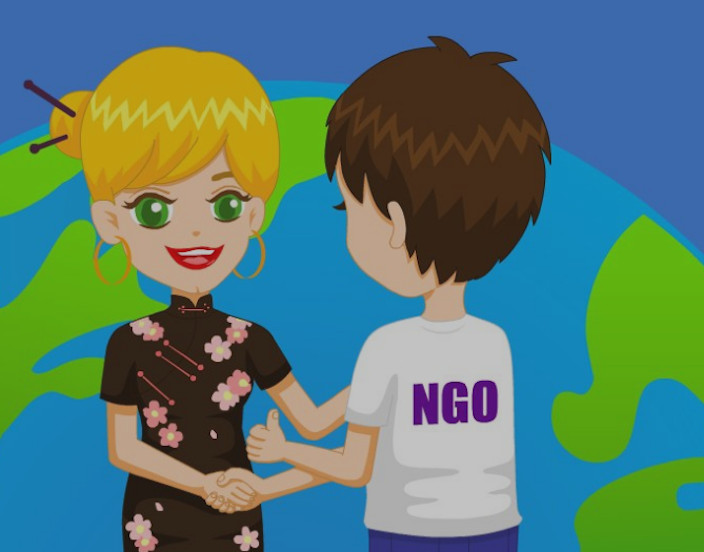The future is beginning to look bright for charities and NGOs in China, which, despite several legal and social setbacks, have grown in popularity in the past decade, both with locals and expats. Despite the fact that China has the second highest number of billionaires in the world, coming in just after the United States, the Chinese aren’t exactly well known for their involvement in charitable work. But now, things are changing: More legal resources and opportunities for participation are available for NGOs and charities, supported by altruistic locals and expats alike.
This March, American businesswoman and philanthropist Elyse Ribbons launched GeiLi Giving, a WeChat based app that connects Chinese users with NGOs through a gamified platform that accepts donations in increments of RMB10. The app sends out bi-monthly messages to subscribers describing projects that need funding. Users will then have the option of donating, allowing them to earn points and become eligible for prizes. After the project is completed, a complete transparency report is issued to participants.

Elyse Ribbons of Geili Giving.
While many charities and NGOs are primarily dependent on ‘big whales’ and grants, Ribbons believes that GeiLi Giving’s unique donation collection system will help engage the philanthropic mind and spirit of Chinese people. “Money can only do so much good,” says Ribbons. “But if you have a lot of people involved, you can see big sweeping changes.”
China has consistently scored quite close to the bottom, if not dead last, in the World Giving Index – an annual report published by the Charities Aid Foundation that ranks over 130 countries in the world by how charitable they are. But Ribbons, who recently relocated to Shanghai from Beijing, says that Shanghai’s economic development puts it in an advantageous position to be successful.
“While RMB10 isn’t much to a person living in Shanghai – not even the price of a cup of coffee – to someone living in a rural area it can make a world of difference,” she says. So far, the app has received positive feedback from locals, and many have shown interest in getting involved.
Katie Littlefield has served as the director of Shanghai’s Chi Fan for Charity for the past six years; she has also been a volunteer and public speaker at several charities and community events in Shanghai. Littlefield says that when she first came to China in 2007, there weren’t many opportunities for expats to get involved with charity work. While many foreigners have grown up with exposure to different NGOs and charities and understand how they work, for China the philanthropic sector was still in its early stages of development.
Littlefield has since observed increased expat involvement and the growth of a new generation of locals passionate about volunteer work, partially kickstarted by the nationwide, government-initiated call for volunteers during the Beijing Olympics in 2008 and Shanghai World Expo in 2010.
“I’ve noticed a trend of small companies based on someone’s passion growing into professionally run organizations that function similarly to a business,” she says. She has also noticed that the relationship between charities has improved. “In the past, organizations would compete with each other rather than sharing resources, for fear of getting shut down. Now, they help each other. If one orphanage has a child that has a heart condition, then they ask Heart to Heart Shanghai to help them provide heart surgery.”

A volunteer at Chi Fan for Charity.
Charitable organizations in China have often been criticized for its inefficiency and its lack in transparency in the way they are run – some even joke that “GONGOs (Government Owned Non-Governmental Organizations)” would perhaps be a more fitting term. This has been attributed to an absence of good management and legal structure at the organizations, making it nearly impossible for them to ensure credibility and garner public support.
China has begun to relax regulations on Chinese NGOs, while cracking down on foreign NGOs. The country’s parliament is currently revising a highly debated draft law that will require the 7,000 or so foreign NGOs in China to find official, government backed sponsors, allowing the Chinese government greater control over the organizations. The proposed law has received a slew of international criticism, but the government maintains that the law will standardize a legal environment for foreign NGOs, and will not prevent them from receiving funds. In contrast, new regulations for Chinese NGOs announced in April 2014 streamline the NGO registration process outlined by the Social Organizations Registration and Administration Act. The process is known to be notoriously long and difficult; requirements include having a full-time staff and regular business location, registration capital of over RMB30,000 and a stamp of approval from supervising government agencies. The new amendment allows direct registration for any NGOs falling into the following four categories: industrial associations, charities, community services and organization dedicated to promoting science and technology.
GeiLi Giving and other social enterprises in China are now able to get legal assistance from organizations such as the Legal Center for NGOs, the only organization of its kind in all of China. Director Giana Lin has been with the Legal Center for NGOs since its initial establishment in Shanghai in 2012 and has seen the organization grow from a few projects a year to over 30 social entrepreneurs and large NGO clients.
“We now have over 200 lawyer volunteers from local and international law firms, universities and multinational companies,” Lin says. “They help our clients with all kinds of legal services, from employment issues, internal governance to contract management.” In addition, Littlefield has served on the advisory board for Community Center Shanghai’s Charity LINK, a program for vetted charities/NGOs to connect with volunteers and find potential funding resources for projects.
With greater transparency and efforts from both locals and expats to make Chinese charities and NGOs more legitimate, and well worth a donation of both time and money, it seems like this could not be a better time to get involved with your family and improve the community here in Shanghai.
Says Littlefield: “I think being in China, more than anywhere else, it is even more important [for expat families to get involved with volunteer work] because there is such a dramatic scale of wealth. Hopefully, more local families will follow as well.”
[Images Via Venture Beat, GeiLi Giving, and Chi Fan for Charity]


















